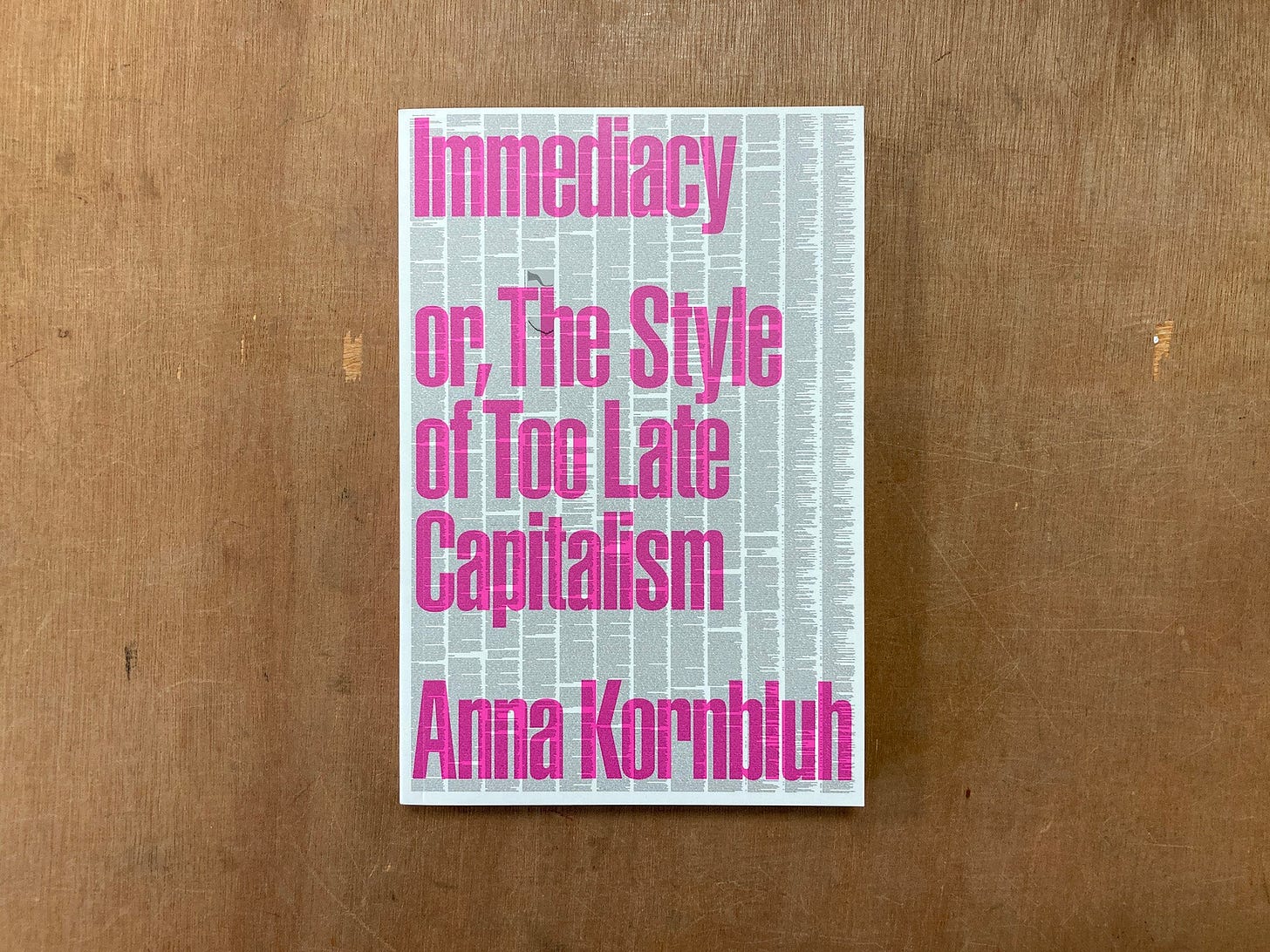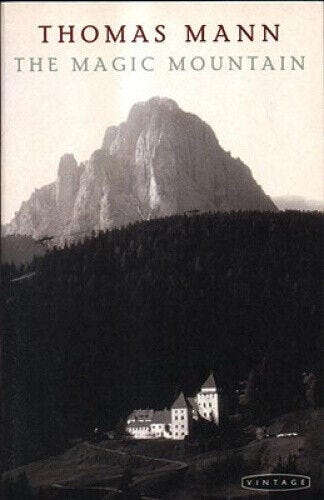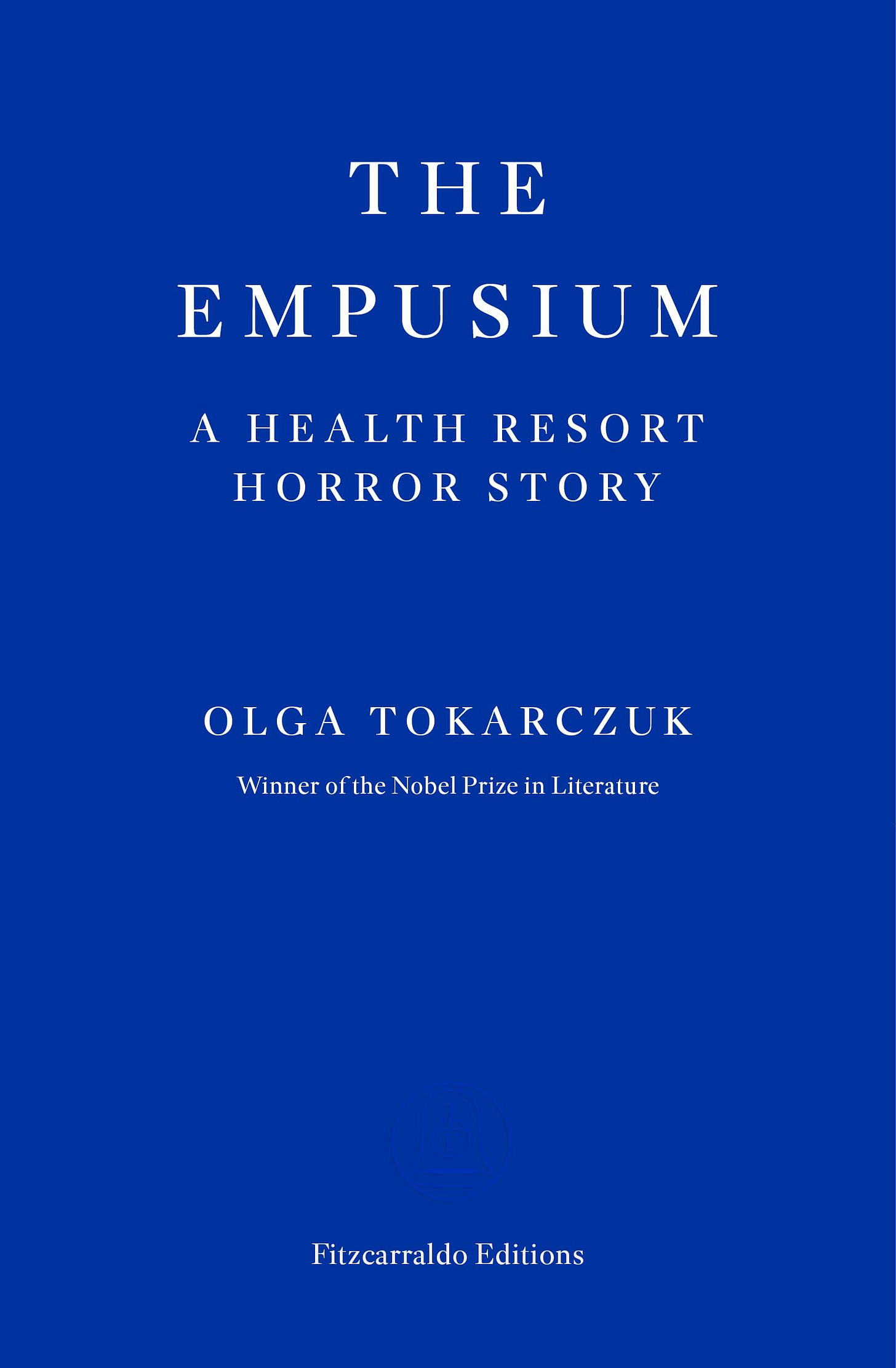Climbing Stories: A Series of Literary Excursions.
Featuring, among others, the following:
Thomas Mann, Death In Venice, (1912)
Thomas Mann, The Magic Mountain (1924)
György Lukács, Essays on Thomas Mann, (1964)
Luchino Visconti dir. Death In Venice (1971)
Ernst Bloch, Michael Lowy and Vicki Williams Hill, New German Critique Number 9 (1976)
Paul Ricoeur, Time and Narrative Volume Two (1984)
Fredric Jameson, The End of Temporality (2003)
Fredric Jameson, The Modernist Papers (2007)
Gore Verbinski dir. A Cure for Wellness (2016)
Anna Kornbluh, Immediacy, Or, The Style of Too Late Capitalism (2024)
Olga Tokarczuk, The Empusium: A Health Resort Horror Story (2024)
Climbing I - An Invitation To Approach The Mountain
“It is remarkable...A man cannot make general observations to any extent, on any subject, without betraying himself, without introducing his entire individuality, and presenting, as in an allegory, the fundamental theme and problem of his own existence.” - Settembrini
But bear in mind, the mountain’s mad with spells tonight
And should a will-o-the-wisp decide your way to light
Beware - its lead may prove deceptive.
- Goethe

As a child, I was often ill. Not in any unique or serious way but the common and all too familiar litany of complaints that make up being young and spending time around the developing immune systems of other young children. Winter colds, summer flu, stomach bugs and fevers or vomiting. Young children are, as every parent knows, just incubators for germs. When I was at my first school - I can’t remember my exact age but I couldn’t have been more than seven years old - I had to go home early. I remember my mother telling me what I said to her when she took back up the hill, away from the small squat buildings of the local primary school towards my childhood home: “I don’t have time for this - being sick is a waste of time.”
This is partly a smart but fairly unhappy child who had internalised that worth depended on work. (I wonder why they grew up and went to graduate school). But thinking about it, there’s something insightful in those words. Being sick removes one from time, from the normative flow of one lesson into another - or, when older - a working day cuts itself short and we become briefly unmoored, the seismic relief of not having anything to do. I remember having my tonsils removed - again, I couldn’t have been older than ten, and it was the first time I expereinced general anesthetic. Count backwards from ten, said the anesthetist. I didn’t make it past eight. I remember wondering when I eventually woke up: where the time had gone? Over the long term, when we are removed from school or work, time bleeds into itself - one day stretches on, the next is just like the one which has gone before it. To be ill is monotonous - but maybe the opposite is perhaps also true? Maybe the day-to-day grind of labor, of unpaid work, of precarity, of the seemingly unconquerable momentum of consumption is the monotony. Maybe that things “just go on” is the catastrophe, as Walter Benjamin said.
Our own perceptions, experiences and memories of time lend themselves well to narrativization - a good story is ultimately an experiment in time, and time is retroactively understood in language. This, of course, raises formal and practical problems of the recounting of experience and narrative, and these then open into the whole complex vistas of both genre and writing more broadly. Just think of the old familiar school exercise when you return from a holiday - “what did you do over the summer, why not tell the whole class?” In that brief question is not only the problem of time, but the problem of narration - and thus, even if only indirectly, the problem of subjectivity. To put this another way, it is through the experience of time - and its retroactive organization into narrative - that subjectivity itself is spotted, flickering past our own perceptions. This is a way of thinking about boredom - I had to stay in hospital after that operation, not for long, but I distinctly remember both the strange and slightly surreal sense of freedom that set in (I could do anything! I didn’t have to be at school!) alongside boredom, which is the friction of subjectivity running up against itself. What did you do with all that time, I was asked, when I went back to school the next week. What could I say: I got bored, and mostly I read books until I got home.
But perhaps even boredom has its own value. Last year, Anna Kornbluh’s book Immediacy, Or, The Style of Too Late Capitalism was published to a lot of attention. Like any polemic, it is generative in as much as it creates polemical responses. After all, polemics are essentially about the clarification of differences and the stakes of an argument. The book is heavily indebted to a philosophy of history shaped by, primarily, Fredric Jameson. If, in Jameson’s Postmodernism, he details the ways in which the modernist culture project had fractured into the self-referentiality of postmodernity, thus hollowing out our sense of capitalist history, this has only accelerated in the era of “too-late capitalism”.
For Kornbluh, what marks the present is an aesthetics of immediacy - first person, overwhelmingly present tense, and presented as reality. We are all plugged in, online, consistently accessible to our employer. The aesthetics of too-late capitalism links to modes of circulation - the flow of services intensifies, customers are provided their goods immediately and businesses prides themselves on their “just in time” logistics. In an ever more digital world, capitalism moves at the speed of code which seeks to make its own operations as invisible and seamless as possible. Ideally there should be no gap between wanting something (a driver to take you somewhere, for example) and the fulfillment of that desire. The dominance of immediacy means the withering away of mediation (whether temporal or spatial). We are all overstimulated and simultaneously bored - the absence of mediation leaves us trapped within ourselves. Mediation is valuable for Kornbluh because it allows us to break out of and think differently - mediation requires interpretation, or to put things in a slightly wider frame, it requires history rather than simply the perpetuation, looping and elongating of the present. As a correlate mediation is both the ground for theory and the necessary condition of any politics that seeks to grasp the totality of a specific conjunction. As China Mieville put it, capitalism is just too fucking loud. Maybe all of us need to retreat to the mountains, take in the air and the rejuvenating waters as they did at the sanatoria all across Europe throughout the long nineteenth century.
In short, in considering the present, we inevitably come back to the problem of time. I was thinking about this over the last few months because of reading Thomas Mann’s The Magic Mountain for the first time. I read it at the close last year, spending a few days suffering through a winter cold and needing a novel that could take me out of myself. My hopes were not high, but the process of working through the whole book was one of those reading experiences that become an indelible part of who you are as a person. The three pillars of the novel are time, sickness and the grand historical fate of European culture - all of which are fused into the form Bildungsroman - the novel of education. However, the Bildungsroman doesn’t just detail what happens to the characters. After all, reading is formative too. To engage with it is to allow yourself to become a different person - or, to put this another way, it was Fred Jameson who pointed out that you never read a text fresh for the first time, but are always already reading it through the various ideological and historical layers of association and meaning that we bring to the text. Thus for the reader, the process of formation - of Bildung - is to become attuned to those layers of association, not to strip them away from the text (reading as an act of purification) but rather of coming to see those things as binding and entangling the text (and you!) to the wider structures of ideology, history and politics.
I read the closing pages just before the Christmas season started in earnest and have been re-reading it essentially ever since. This is an attempt to work through it, and perhaps offer some encouragement for people who haven’t read it. I knew, almost as soon as I reached the final pages of the book for the first time that I would have to write about it, but I don’t think I would have tried to write this about it this much if not for Kate Wagner’s excellent essay series over at The Late Review on Wagner’s Ring Cycle. (And, as I’ll get to, there’s plenty of overlap between The Magic Mountain and Wagner particularly). It is a novel of time, illness and experience - the very antithesis of immediacy. It requires mediation - not just in terms of its content, but in its form and the history within which it exists.
The story is on one level very simple and one relatively easy to summarise. In, or about the year 1907, an ordinary young man, called Hans Castorp travels from Hamburg to visit his cousin Joachim who is staying in a sanatorium in Davos, Switzerland to recover from tuberculosis. Hans Castorp intends to go for a trip of three weeks before descending down the mountain, returning to the “flat land” and taking up his new position as an engineer. He does not stay for three weeks, but only descends the mountain seven years later. In that time, he falls in love, becomes obsessed with music, is involved in a seance and multiple long conversations on philosophy, history and the nature of existence. The book is long - well over 300,000 words and 900 pages across two volumes. If you’ve never read it before, perhaps the initial response might well be something like my own when I had to leave school. Perhaps you too feel like you don’t have the time for this. That is not an unreasonable response, but also it’s a symptomatic one - it’s also the response that Hans Castorp has to the early suggestion that he should stay in the mountains for at least six months but his own sense of curiosity (and the strange hypnotic effect of being there) drive him inexorable towards staying.
I said the plot is easy to summarize - but this is true only if the plot is thought of as an accumulation of events. Rather, what gives the novel its significance is the experience of the formation of subjectivity. Hans Castorp, the ordinary bourgeois Hamburger, becomes someone else in his time on the mountain. His conversations with Settembrini and Naptha on meaning, history, philosophy and existence are not simple intellectual exercises but moments in the construction of a certain kind of subject - in this, as I found out, his experience has something in common with the act of reading itself.
Reading - at length and complexity, with something that demands both attention and interpretation is a time intensive act. It is profoundly unproductive - but that is sort of the point, right? In an era of immediacy the internet is awash with AI powered summaries, of apps that will give you a book in 15 minutes, boiling down language and experience and the transformative power of mediation into thin intellectual gruel - a series of bullet points designed to make you a better, more productive business leader. The point of immediacy is to optimize the effort - and the pleasures - of thought out of existence, freeing you up to be the malleable subject needed by capital.
Yes, the book is long but reading it is no chore. This is not the equivalent of trying to tell people they have to eat their literary greens, to suffer through something dull because it is supposed to be in some way “good for you”. So much popular writing about older literature makes it seem so inaccessible - placing it beyond the reach of new readers and at the same time stripping it of all the joy and pleasure that it can provide. The book does ask a lot but please don’t think you should do anything - Mann himself was well aware of this. As he said in an essay called The Making of the Magic Mountain, and published (of all places) in The Atlantic
A work of art must not be a task or an effort; it. must not be undertaken against one’s will. It is meant to give pleasure, to entertain and enliven. If it does not have this effect on a reader, he must put it down and turn to something else.
And I cannot stress enough that it is a colossal pleasure - Mann’s narrative voice is amusing and wry. He consistently refers to his main character throughout with his full name - no matter how well we get to know him he remains always introduced as “Hans Castorp.” This gently amused narrative voice is something Olga Tokarczuk would refine and build on with her constant use of “We” as the narrative voice of that excellent riposte to Mann, The Empusium.
Another detail I really love: Mann has his main character spend much of his time falling passionately for another and not confessing his feelings for half the novel. When he finally does so, he does it almost entirely in French, and he carries around with him a miniature X-ray of her tuberculosis stricken lung.
The novel is strange and is, in places, so beautiful and moving as to render one breathless. It is an insight into a world that was - even in 1924 - something of a ghostly one on the edge of winking out of existence. Jameson, in The Modernist Papers, calls the novel “posthumous.” It is a precisely observed record of a historical moment that was collapsing into something new. An entire century was ending, headed into the charnel house of the first world war. As Walter Benjamin writes in The Storyteller:
A generation that had gone to school on a horse-drawn streetcar now stood under the open sky in a countryside in which nothing remained unchanged but the clouds, and beneath these clouds, in a field of force of destructive torrents and explosions, was the tiny, fragile human body.
To spend some time on the mountain with Hans Castorp and the other inhabitants of the Berghof is to spend time in a world that is rich, thrilling and complex and at the same time, dying. It is the apotheosis of a particular tradition of realism, and the German novel of education, and as a result links all the way back to something like Goethe’s Wilhelm Meister and forward to the debates on realism and postmodernism that would occupy so much of the twentieth century. In short, the novel stands as a hinge point - the ending of one particular kind of Europe, and thus, one particular kind of subjectivity, and the emergence of something new. Its questions are still urgent I think: What does it mean to try and become a person - to live a life in a world that is, in a way, coming to an end? We don’t have time for that - we have to be productive, we have so much to do. But perhaps this has persuaded you - take a moment. Look upward, and take in the view. You don’t have to climb all that way, and if you do you may find yourself deeply and wonderfully changed by the experience. It’ll take plenty of time, but once you are up there, what does “time” even mean? As Mann closes his forward to the novel, explaining the story he wants to tell:
We shall tell it at length, thoroughly, in detail - for when did a narrative seem too long or too short by reason of the actual time or space it took up. We do not fear being called meticulous, inclining as we do to the view that only the exhaustive can truly be called interesting.
Part II: Some Necessary Context and the Problem of Realism. Coming soon.




